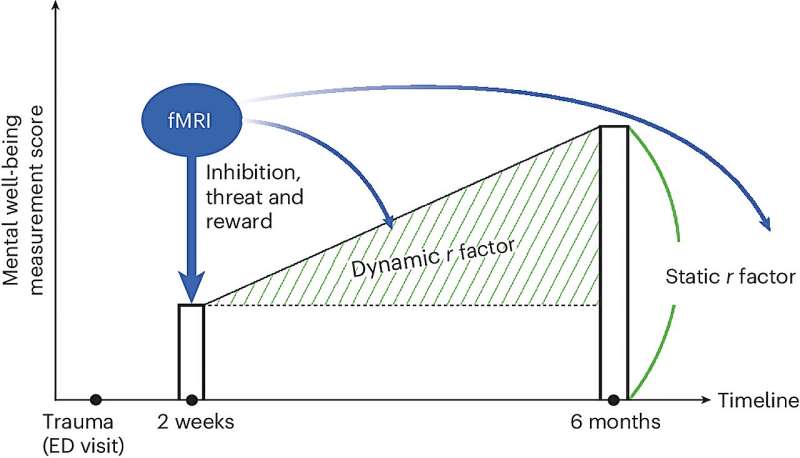This article has been reviewed according to Science X's editorial process and policies. Editors have highlighted the following attributes while ensuring the content's credibility:
fact-checked
peer-reviewed publication
trusted source
proofread
Study uncovers key factors for resilience after trauma

Following traumatic experiences, many individuals demonstrate remarkable resilience, recovering their mental and behavioral well-being without external intervention. An Emory University-led study, in collaboration with the University of North Carolina School of Medicine and other sites, is improving the understanding of how some people recover from trauma better than others, marking a significant advancement in resilience research.
Findings were published online April 22 in Nature Mental Health.
Conducted as part of the multi-site AURORA Study, the largest civilian trauma study to date, researchers recruited 1,835 trauma survivor participants from hospital emergency departments across the nation within 72 hours of their event.
The participants experienced a variety of traumatic events, including motor vehicle collisions, high falls (>10 ft), physical assault, sexual assault or mass casualty incidents. The aim was to better understand how brain function and neurobiology increase the risk for trauma-related mental health issues.
Researchers discovered a common factor among study participants termed the general resilience "r factor." This factor was found to account for more than 50% of the differences in mental well-being participants experienced six months post-trauma. The team discovered specific patterns in brain function, particularly how the brain responds to rewards and threats, can predict how resilient someone will be after experiencing trauma.
"This research marks a significant shift in understanding resilience. In previous research, resilience was often viewed through the lens of one specific outcome, such as posttraumatic stress, overlooking the diverse impacts of trauma, including potential chronic depression and changes in behavior," says co-principal investigator Sanne van Rooij, Ph.D., assistant professor, Department of Psychiatry and Behavioral Sciences at Emory University School of Medicine.
"We've examined resilience in a multidimensional manner demonstrating how it impacts numerous aspects of mental health, including depression and impulsivity and is linked to how our brains process rewards and threats."
By examining MRI brain scans of a subset of participants, van Rooij and her colleagues also discovered certain brain regions exhibited heightened activity in individuals who demonstrated better recovery outcomes.
These findings underscore the intricate interplay between neural mechanisms and resilience in the aftermath of trauma, offering valuable insights into the factors that facilitate effective coping and recovery processes.
"This study shows that resilience is not just about bouncing back—it's about how our brains react to positive and negative stimuli which ultimately shape our recovery trajectory," says van Rooij.
For individuals who experience trauma, these findings could lead to better predictions of who might suffer from long-term mental health issues and who might not. This means doctors and therapists could someday use these brain patterns to identify patients who need the most support early on, possibly preventing severe mental health problems with targeted treatments.
"We've discovered a key factor in understanding how people cope with stress, and it's linked to specific parts of the brain that handle attention to reward and feelings of self-reflection," says study co-leader Jennifer Stevens, Ph.D., associate professor, Department of Psychiatry and Behavioral Sciences at Emory University School of Medicine.
"Our findings have significant implications for clinical practice. By identifying the neural underpinnings of resilience, we can better target interventions to support those at risk of persistent mental health issues."
More information: Sanne J. H. van Rooij et al, Defining the r factor for post-trauma resilience and its neural predictors, Nature Mental Health (2024). DOI: 10.1038/s44220-024-00242-0





















